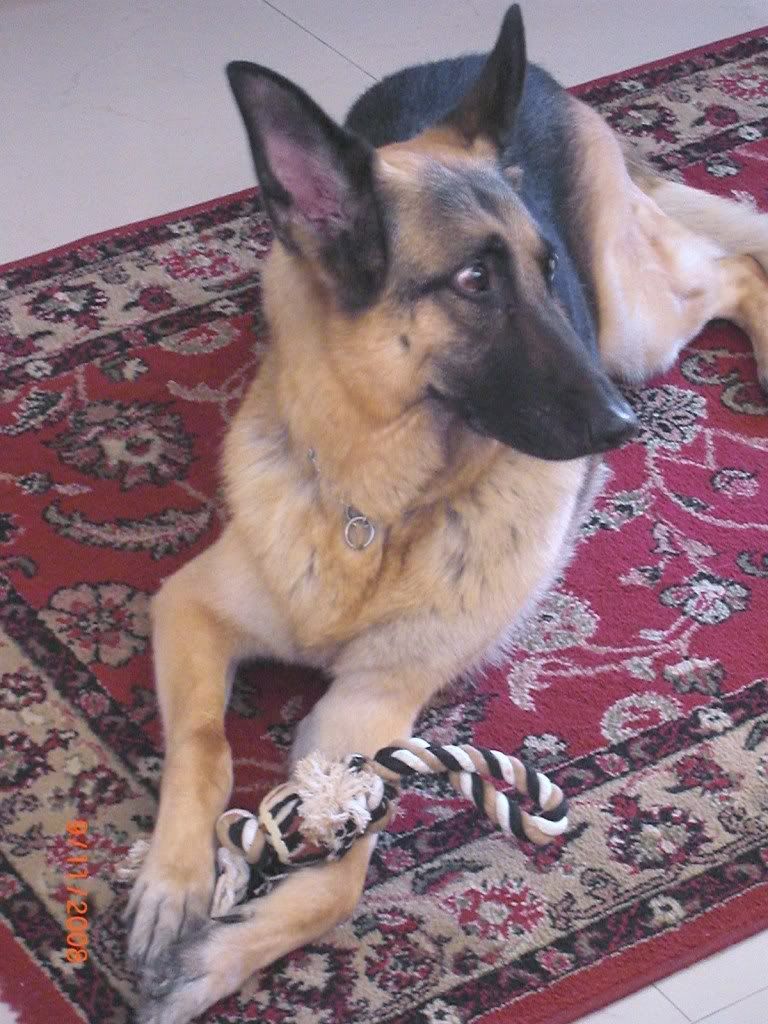Pet Wellness embraces many areas of a healthy happy pet so in appreciation of Stress Awareness Month learn how you can identify and eliminate pet stress to give him a longer, happier, healthier life.
April is Stress Awareness Month and this applies to all living things, big, small, human or not - particularly our pets. Are you surprised to read that animals have stress? Stress affects our dogs and cats and various type pets across the board. Pet stress just like people stress causes health problems, decreases the quality of life, causes depression, and shortens life span. For these reasons, amongst others, it is necessary for pet owners to practice another part of pet wellness which is finding out if their pet is stressed, identifying the stress factors, and using the necessary techniques to eliminate the stress and increase the quality of their pet's life.
Pet Stress Signs
Many pet stress signs can also be signs of other problems so do not just assume it is stress. It's important to look into all the avenues in order to efficiently help your pet and save yourself and your pet future health problems and chunky vet bills.
1. Itching
Itching is a sign of several things such as fleas, ticks, lice, or skin allergy but it can also be a sign of stress if your dog or cat is itching himself more than normal. Eliminate the possibility of fleas, ticks, lice and allergy first, and then consider that it could be your pet is stressed. Natural health care for pets treatments offers effective allergy itching remedies that can be administered at home. Treating itching and discomfort from allergies and eliminating the allergy source will also keep your pet from suffering from stressed caused by discomfort - from ongoing itchiness.
2. Excessive shedding
The more pet stress there is the more shedding there will be. Shedding however is also common with poor quality dog food, poor diet, and can also be genetics, as well as a dog that is not getting enough sun light. Another condition of excessive shedding is when the pores of the dog's skin do not close all the way allowing hair to fall constantly. This usually requires a vitamin such as Biotin to help. Or, your pet could be too stressed out.
3. Lethargy
A lethargic pet is always a sign that something is not right and needs to be looked into urgently. Lethargy can stem from depression, poor health, not enough exercise and unhappiness. Or, your pet's stress is on fire. Usually a vet will request a stool sample in order to get to the root of this problem.
4. Aggression
A sick, injured or pet in pain may be aggressive if approached or stroked, outside of this your pets aggression could be stress related.
5. Lack of or no appetite
Pets that are stressed, sick, or depressed will often eat less or lose their appetite all together. This is another area, obviously that needs to be immediately addressed if noticed by pet owners.
6. Lack of interest
A dog or cat that suddenly shows lack of interest in things he was always excited to do or enjoyed doing is a sign of a sick, sad, or depressed pet. Check for sickness first then consider stress as a reason.
7. Passive behavior
The opposite of aggression, some pets will become passive when stressed.
8. Negative behavior
Often pets who are bored will dig, chew, or bark constantly. A stressed or sad dog will be destructive, this is also a common behavior of intelligent breeds who are not left alone for long periods of time or not exercised physically and mentally enough for their breed.
9. Change is bathroom habits
A dog that is house trained or a cat that is litter box trained who suddenly forgets this and goes in the house, could be stressed or sad. Consider the age of your pet and for how long he has been trained because accidents do happen and especially during the puppy stages or learning stages.
10. Sounds
Funny as it may be cats will often purr when they are stressed, sad or even dying - as opposed to a dog that will growl when unhappy or agitated.
11. Body Language
Many pets, particularly dogs and cats will have a change in body language such as slouching while they walk, hanging their head low, walking more slowly than usual, and laying down all the time. This could be a sign your dog or cat is not well, has an injury, is depressed, or experiencing pet stress.
Happy Pet Signs
1. Curious
2. Playful
3. Shows recognition of people he knows
4. Normal stools and bathroom habits that are rarely disturbed
5. Over all happy appearance and behavior
6. A healthy appetite
Just like people dogs and cats have different personalities and owners, with different lifestyles and different environments. Dogs and cats will handle their stress in different ways - some are more wound up and edgy while others go with the flow and may not be too bothered by things. When a pet owner is stressed or depressed it can affect their pets, particularly a dog or cat, as these animals are very open to the feelings, spirit, and environment of their owners. If you are stressed, anxious, or depressed, it is highly likely that your dog or cat will be as well.
But there are other factors that can cause your dog or cat pet stress.
1. Pet wellness requires pet owners to identify if their pet is stressed and take the necessary actions to improve the situation. Consider first yourself. Are you stressed more than the norm? Are you depressed, sad or feeling anxious and nervous? Remember that just like your kids, your pet will pick up on your stress and if it's having a direct hit on your behavior, state of mind, actions and personality, it is certainly affecting your pet as well.
2. If your pet is sick and is not getting better this can cause him stress and unhappiness just as it would you. So keep an eye on your pet and be sure to take action on any out of the norm situations that may arise. Do not delay because you don't know what the situation might be and it could be time sensitive, making all the difference between recovery or death. For pets that already have an illness or health issue stress can delay healing, and even cause the problem to become chronic if your pet is dealing with unrelenting stress.
3. Constant television, flashing lights, lack of visual stimuli, smoke or polluted living environments all can cause dog stress through his eyes. Consider turning off your television for some time during the day, easy lights in the evenings, toys and a stimulating, clean air environment.
4. Once again, just like with our kids the television can become a problem if not managed in the household. A constant, loud television can add stress through your dog's ears. Loud noises, other dogs constantly barking, people arguing, children screaming, sirens, video games, thunder storms and slamming doors that are consistent in a pets environment are other stresses through sound can affect your dog. Consider classical music for your dog or cat when you leave him home alone as opposed to television or the radio. Classical music is quiet, slow and relaxing and proven to be favored amongst dogs and cats. There is loads of pet music CD's available these days that have clinically proven types of music most suitable and enjoyed by dogs and cats. An antistatic cape can be used for help with dog that suffer from thunderstorm stress. Consider the noise level in your home and make changes for a calmer, quieter atmosphere if necessary.
5. Perfumes, excessive or irritating essential oils, hair spray, air fresheners, deodorants, and smoke are also stress culprits that cause anxiety or agitation through the dog's nose. For health reasons and global warming signs it is preferred that people not be use air fresheners in their homes or vehicles. Instead get to the root of the odor problem and try a natural freshener such as boiling are cooking a cinnamon stick. Don't use perfumes, deodorants, hair sprays or smoke around your pet. Instead keep use of these items to one room to keep the rest of the house clean.
6. For anxiety and fear, pet owners will often consider a product called Dog Appeasing Pheromone. However, before you go that route consider Lavender aromatherapy, which has shown success in reducing stress, sadness and restlessness in dogs housed in shelters and dog pounds.
7. The mouth and digestive system of a dog also play a part in stress. A poor diet, unhealthy teeth and gums not getting enough water, or having to compete for food are all sources of pet stress. Make sure your dog is getting regular dental check-ups and regular cleaning.& A safe and trusted eating environment, fresh clean water daily, a balanced healthy diet
8. Temperature and climate are also sources of stress. A pet in uncomfortable, painful or isolated living conditions will have high stress levels.
9. Excessive exercise, poor training techniques, and injuries gone untreated can cause arthritis and joint disease. Poor training can also cause fear and lack of trust, all of which bring on pain and stress. Exercise should be breed and age appropriate, fun and stimulating and moderate. Training should be age and breed appropriate and never on a hard core, cruel basis. To protect against injuries, joint disease and arthritis, ensure your dog or cat receives body-benefiting treatments such as pet massage, cold or hot heating pads and swimming in the pool if possible. Make sure your dog is comfortable with water first and that you are with him when he is taking a dip. Like a child, never leave your pet alone in or near water. Massages do not have to be expensive you can learn to do it at home, as well as many other natural health care for pets practices.
In the spirit of stress awareness month remember that being a responsible and conscientious pet owner requires you put pet wellness into practice and keep abreast of any changes in your pet, just as you do yourself your children. Be aware of changes in behavior of any kind to be addressed and sourced to the root of the problem. Stress is the not the cause for all problems your pet may encounter but it should certainly never be ruled out. Give your pet the quality of life he deserves by ensuring his meals, treats, exercise, training, lifestyle, treatments and environment are healthy ones and appropriate for his breed and age. Giving your pet a wholesome pet natural diet vegetable enhanced and free from poor quality food ingredients, unhealthy additives will maintain your pet's inner and outer beauty as well as protect him from disease. Maintain his health further by doing your level best to eliminate pet stress and enhance the length and quality of your pet's life.
For more assistance with cat stress visit Cat Behavior.
Subscribe to:
Post Comments (Atom)





















































people like pets. As pets need special health care. they need regular check up . Many service providers provides regular check up to the pets. as the info in the article is very nice. for more info Visit Our Site .
ReplyDeletepeople like pets. As pets need special health care. they need regular check up . Many service providers provides regular check up to the pets. as the info in the article is very nice. for more info Visit Our Site .
ReplyDelete